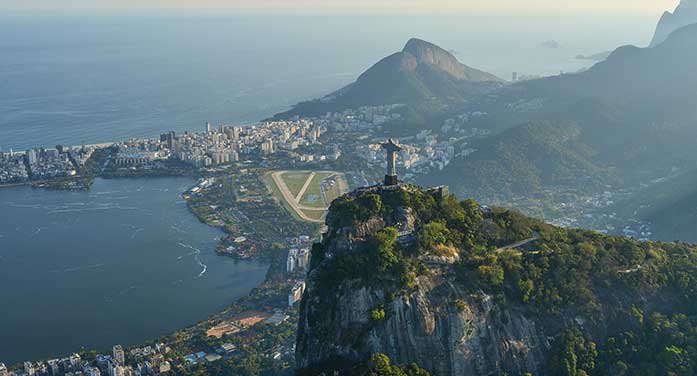 In November 2018, Canada and Mercosur opened free-trade negotiations. Any such deal represents great potential for Canada – but there are concerns.
In November 2018, Canada and Mercosur opened free-trade negotiations. Any such deal represents great potential for Canada – but there are concerns.
Mercosur – Argentina, Brazil, Paraguay and Uruguay – is a bloc with a gross domestic product of over $3 trillion and a population of 261 million in 2019. That compares to the GDP of Germany, with a population close to Indonesia.
Among the Mercosur countries, Brazil has a preeminent position: 212 million habitants and a GDP of 1.8 trillion in 2019. Considering that South America and North America have primary diplomatic, cultural and economic links, free trade between Canada and Mercosur would be a shared asset – especially considering that the European Union is concluding a free trade agreement with the bloc.
The whole of Latin America and the Caribbean represented 11 per cent of the inflows of foreign direct investments in the world in 2018. That’s a little less than Europe (13 per cent). Between Canada and Mercosur, bilateral trade represented $9.9 billion in 2019.
Brazil has experienced an impressive growth of its trade, based on 2018 data: 7.1 per cent real exports growth and 6.8 per cent real imports growth. These numbers are higher than those of advanced countries (three per cent for export and import) and are comparable to those of Asian countries. South America, and especially Mercosur countries, represent a promising region for trade.
 For the Brazil-Canada Chamber of Commerce, Brazil exports to Canada represented $3.7 billion and Brazil imported from Canada $2.2 billion in 2015. Brazilian exports to Canada are mainly aluminum oxide, petroleum oils, sugar, gold, coffee, insulin, antibiotics, iron and steel. Brazil imports potassium chloride, nuclear reactors and turbojets, bituminous coal, newsprint, wheat and aircraft.
For the Brazil-Canada Chamber of Commerce, Brazil exports to Canada represented $3.7 billion and Brazil imported from Canada $2.2 billion in 2015. Brazilian exports to Canada are mainly aluminum oxide, petroleum oils, sugar, gold, coffee, insulin, antibiotics, iron and steel. Brazil imports potassium chloride, nuclear reactors and turbojets, bituminous coal, newsprint, wheat and aircraft.
Petroleum and other fossil fuels account for 10 per cent of Brazil’s global imports. This can be an asset for Canada’s Prairie provinces, which have substantial mining and energy sectors. This sector produces 16 per cent of Alberta’s GDP and 25.7 per cent of Saskatchewan’s GDP.
Accordingly, a free-trade agreement would help Canadian exporters. However, Canadians’ export tariffs to Mercosur are up to 35 percent in many primary and industrial sectors. That’s a significant barrier.
The political instability and polarization of Latin America also hamper efficient trade. Free-market and economic liberalism are not popular values among many politicians in the region.
For example, Argentina is establishing protectionist policies to fight high inflation, which is forecast to reach 50 per cent. The Argentine government suspended corn shipments through February to force growers to sell to the local livestock industry. Argentine farmers are worried that this ban will hurt them.
From a Canadian perspective, it raises questions about the reliability of the Argentine government on open trade.
In Brazil, the October elections will significantly impact the Mercosur situation and that country’s relations with the rest of the world. There are strong possibilities the duel will be between President Jair Bolsonaro and former president Luiz Inácio Lula da Silva.
Bolsonaro wants to align the country more closely with the United States. Still, tensions with environmentalists have hindered his efforts to become closer to the western world. On the contrary, under Lula’s past mandates, Brazil reinforced its presence in the BRICS group of Brazil, Russia, India, China and South Africa. Strong relations with China were also a significant point of Lula’s foreign policy.
Canadian trade policy in South America would have to manage this explosive political situation. Taking a more neutral position can give Canada an advantage in this region over the U.S. However, the federal government will have to work pragmatically with these countries and defend the interests of Canadians and our economy.
Alexandre Massaux is a research associate at the Frontier Centre for Public Policy.
Alexandre is a Troy Media Thought Leader. For interview requests, click here.
The Frontier Centre for Public Policy is an independent Canadian public policy think tank. It does not accept any government funding whatsoever. It relies on diversified funding to maintain its independence.
The views, opinions and positions expressed by columnists and contributors are the authors’ alone. They do not inherently or expressly reflect the views, opinions and/or positions of our publication.
© Troy Media
Troy Media is an editorial content provider to media outlets and its own hosted community news outlets across Canada.

